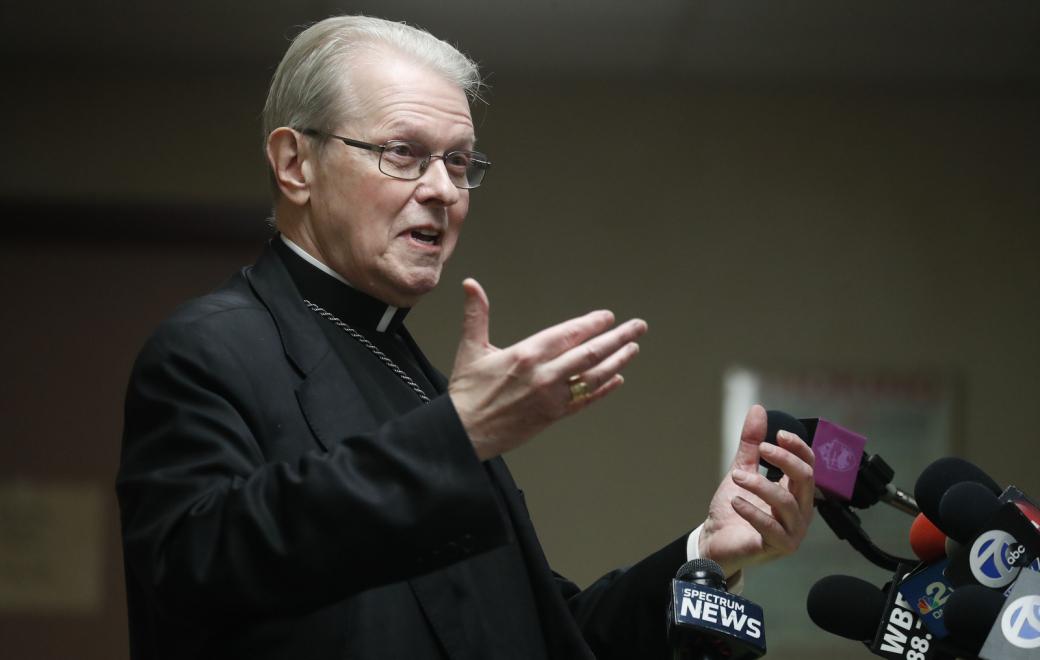|
Editorial: A welcome transition for the Buffalo Diocese
Buffalo News
The resignation of Bishop Richard J. Malone gives the Catholic Diocese of Buffalo a chance to move forward from the sexual abuse scandal that has tarnished the church here for months. Malone’s retirement is not the end of the story, but a beginning. There is a long way to go in winning back the trust of Western New York Catholics who lost faith in an institution that was interwoven into many of their lives. The diocese’s new interim leader, Albany Bishop Edward Scharfenberger, gave every indication Wednesday that he can play an important role in the healing and reconciliation that must take place. “We are all family,” Scharfenberger said at his introductory news conference. “The survivors of sexual abuse are our family. I want everyone to know that they will be treated with respect. … I’ll meet with any and all survivors.” The vast majority of criminal sexual acts allegedly committed by members of the clergy took place long before Malone took over the diocese here. While he often made public apologies for the misdeeds of the past and spoke of his desire to bring about healing, Malone too often seemed entwined with the church’s culture of secrecy and obfuscation. He was accused of keeping two priests in ministry despite misconduct complaints against them involving adults, and of returning to limited ministry a priest who had made inappropriate comments on Facebook to an eighth grade boy. Documents leaked to the media in 2018 showed that Malone had understated the number of priests or clergy from the diocese who had been credibly accused of sexually abusing children. The Movement to Restore Trust, a lay committee formed to offer guidance to the diocese, joined in the public call for Malone’s resignation in early September. That took place after Malone was heard discussing in a taped phone call his worries about the public reaction if word got out about a possible “love triangle” involving two priests and a seminarian. Victims of clergy sexual abuse have not been listened to and treated with the compassion they deserve. That will be among the priorities awaiting Bishop Scharfenberger and whoever is selected as the next full-time head of the diocese. Scharfenberger took over the Albany Diocese in 2014 following the retirement of Bishop Howard Hubbard, who was accused of sexually abusing children. Scharfenberger has been praised for openly confronting the issue. Last year, he invited the Albany County district attorney to investigate the diocese’s response to allegations of child sex abuse. The diocese’s new apostolic administrator would be well-advised to seek the counsel of the Movement to Restore Trust. One of the MRT’s leaders, Canisius College President John J. Hurley, wrote in an opinion article for The News last Sunday that the group would also like to give input to the apostolic nuncio when the next bishop is being selected. The nuncio, Archbishop Christophe Pierre, should take them up on the offer. Sexual abuse scandals reach far beyond the boundaries of the Buffalo Diocese. From the Boston Globe Spotlight team’s groundbreaking stories 17 years ago of child abuse in the Boston Diocese, to a devastating report by the attorney general of Pennsylvania detailing sexual crimes committed by priests in that state, the tales of abuse and cover-ups have metastasized throughout the body of the church. One new bishop in Buffalo’s diocese of more than half a million Catholics can only do so much. To win back the support and trust of the faithful, the Catholic Church will need to introduce real reforms that acknowledge the sins of the past and point the way to a better future, where all worshippers can feel safe and welcome. That will not be easy in an institution with centuries-old traditions. It will require Vatican leaders to take risks. At this point the risks of doing nothing appear far greater.
|
.
Any original material on these pages is copyright © BishopAccountability.org 2004. Reproduce freely with attribution.
